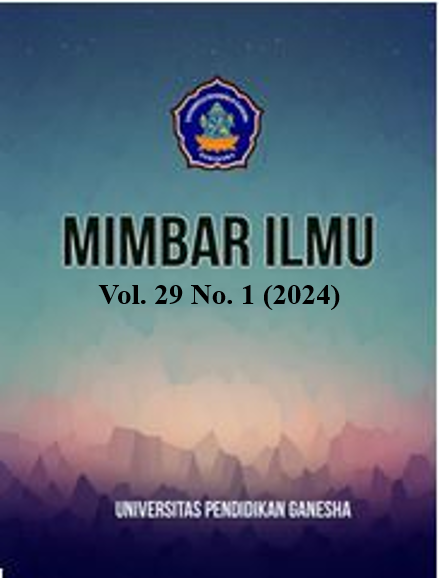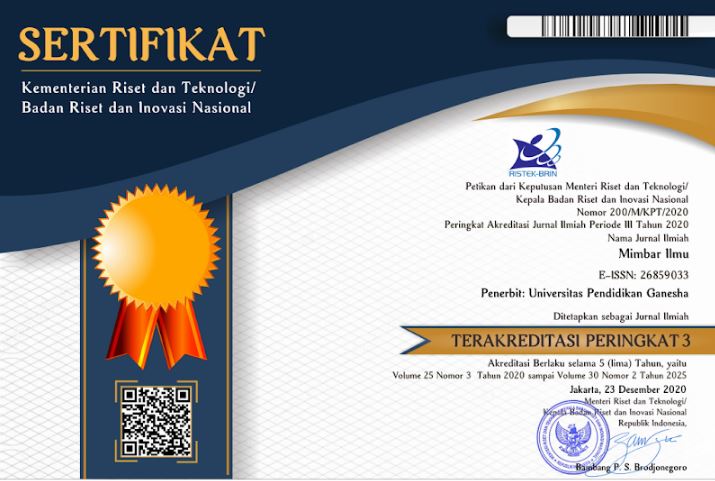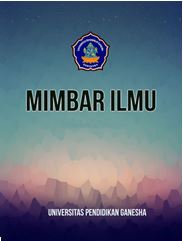Stepping Towards Transformation: Student Political Awareness through Instruction the Development of the 21st Century Political Education Curriculum
DOI:
https://doi.org/10.23887/mi.v29i1.64132Keywords:
Consciousness, Politics, Instruction, Curriculum, 21st Century SkillsAbstract
Contribution in directing the transformation of political education to prepare more informed and politically engaged citizens in the 21st century. This study aims to analyze the political awareness index of students through teaching in the development of the 21st century political education curriculum. The research method used was a quantitative survey involving respondents from the student population. Respondents were randomly selected using a simple random sampling technique. Data were collected using questionnaires that have been prepared based on conceptual frameworks relevant to research variables. The collected data is then statistically analyzed using descriptive methods and inferential analysis to identify significant relationships and patterns between the variables studied. The results of this study are expected to provide a deeper understanding of the Student Political Awareness Index and the role of teaching in the development of the 21st century political education curriculum in shaping student political awareness. Through this article, it can be concluded that the Student Political Awareness Index and the role of teaching in the development of the 21st century political education curriculum in shaping student political consciousness.
References
Asokan, A. G., Varghese, V. A., & Rajeev, A. (2019). Internet addiction among medical students and its impact on academic performance: an Indian study. Journal of Medicine of Science Clinical Research, 7, 670–676. https://doi.org/10.18535/jmscr/v7i3.122.
Balart, P., Casas, A., & Troumpounis, O. (2022). Technological change, campaign spending and polarization. Journal of Public Economics, 211. https://doi.org/10.1016/j.jpubeco.2022.104666.
Belladonna, A., Hidayah, Y., & Tripuspita, N. (2023). Responding to The Challenges of The 2045 Golden Generation: Improving a Legal-Aware Golden Generation with a Cultural and Identity Education Approach. Edunesia: Jurnal Ilmiah Pendidikan, 4(2). https://doi.org/https://doi.org/10.51276/edu.v4i2.412.
Birger Sagiv, I., Goldner, L., & Carmel, Y. (2022). Civic Engagement in Socially Excluded Young Adults Promotes Well-Being: The Mediation of Self-Efficacy, Meaning in Life, and Identity Exploration. International Journal of Environmental Research and Public Health, 19(16). https://doi.org/10.3390/ijerph19169862.
Bush, T., & Glover, D. (2016). School leadership and management in South Africa. International Journal of Educational Management, 30(2), 211–231. https://doi.org/10.1108/IJEM-07-2014-0101.
Chevrier, B., Lamore, K., Untas, A., & Dorard, G. (2022). Young adult carers’ identification, characteristics, and support: A systematic review. Frontiers in Psychology, 13. https://doi.org/10.3389/fpsyg.2022.990257.
Creswell, J. W. (2018). Creswell_Research_Design_ Qualitative, Quantitative, and Mixed Methods Approaches. In Sage Publications Inc.
Dewi, K. P. (2018, November). Multicultural Integration in Social Studies Through Cultural Value of Pancasila Approach: An Effort to Build the Character of Indonesian. Proceedings of the 1st International Conference on Social Sciences Education - “Multicultural Transformation in Education, Social Sciences and Wetland Environment” (ICSSE 2017). https://doi.org/10.2991/icsse-17.2018.40.
Dong, N. (2021). Research on the Innovation Mode of Scientific Research Service of University Library Based on the Operation Mode of Question-and-answer Community. In P. S. (Ed.), 5th Annual International Conference on Data Science and Business Analytics, ICDSBA 2021 (pp. 185–188). Institute of Electrical and Electronics Engineers Inc. https://doi.org/10.1109/ICDSBA53075.2021.00046.
Fei, Z., & Ding, L. (2021). Research on Teaching Innovation of Basic Courses of Ideological and Political Education in Universities Integrating Computer Multimedia Technology. 2020 International Conference on Mechanical Automation and Computer Engineering, MACE 2020, 1744(4). https://doi.org/10.1088/1742-6596/1744/4/042123.
Hakoniemi, E. (2021). The labor movement as an educational movement: A conceptual history of sivistys within the Finnish Workers’ Educational Association 1920s–1960s. International Labor and Working-Class History, 99, 75–95. https://doi.org/10.1017/S014754792000023X.
Hang, X. (2021). Reform and Challenges of Ideological and Political Education for College Students Based on Wireless Communication and Virtual Reality Technology. Wireless Communications and Mobile Computing, 2021. https://doi.org/10.1155/2021/6151249.
Hu, X., Ma, C., & Jiang, W. (2021). Forgery Attack And Improvement on Certificateless Aggregate Signature Schemes As Cases In Courses For Ideological And Political Education Based on Vehicular Networking Technology. 2nd International Conference on Information Science and Education, ICISE-IE 2021, 264–267. https://doi.org/10.1109/ICISE-IE53922.2021.00068.
Ibrahim, S. (2021). The dynamics of the Egyptian social contract: How the political changes affected the poor. World Development, 138. https://doi.org/10.1016/j.worlddev.2020.105254.
Iskhakova, N. H., Chuprii, L. V, Lyasota, L. I., Bondar, L. V, & Lytvynchuk, N. B. (2020). Innovative approaches of political education in Ukraine: On the example of developed western democracies. Academic Journal of Interdisciplinary Studies, 9(2), 127–141. https://doi.org/10.36941/ajis-2020-0030.
Jouini, N., & Ben Akal, M. (2022). Political consensus, economic reforms, and democratic transitions in the Middle East: Evidence from voting on Tunisian reform bills. Politics and Policy, 50(4), 851–871. https://doi.org/10.1111/polp.12489.
Kao, J. C. (2021). Family Matters: Education and the (Conditional) Effect of State Indoctrination in China. Public Opinion Quarterly, 85(1), 54–78. https://doi.org/10.1093/poq/nfab007.
Li, G., & Qi, Y. (2021). Research on the Competency Model of University Teachers under the Background of Curriculum Ideological and Political Education. 3rd International Conference on Applied Machine Learning, ICAML 2021, 136–139. https://doi.org/10.1109/ICAML54311.2021.00036.
Li, L. (2021). Intelligent Evaluation of College Students’ Ideological and Political Education Effect Based on Big Data Technology. 2021 International Conference on Intelligent Transportation, Big Data and Smart City, ICITBS 2021, 418–421. https://doi.org/10.1109/ICITBS53129.2021.00109.
Li, W. (2021). The Development Path of Ideological and Political Education Innovation in Universities Based on the Computer. 2020 International Conference on Mechanical Automation and Computer Engineering, MACE 2020, 1744(3). https://doi.org/10.1088/1742-6596/1744/3/032249.
Liu, J. (2021). Design of Flipped Classroom Mode for Ideological and Political Education Based on Online Multimedia Platform. 2020 International Conference on Mechanical Automation and Computer Engineering, MACE 2020, 1744(4). https://doi.org/10.1088/1742-6596/1744/4/042145.
Lv, X. (2021). A Quality Evaluation Scheme for Curriculum in Ideological and Political Education Based on Data Mining. 13th International Conference on Measuring Technology and Mechatronics Automation, ICMTMA 2021, 649–652. https://doi.org/10.1109/ICMTMA52658.2021.00149.
Malik, R. S. (2018). Educational challenges in 21st century and sustainable development. Journal of Sustainable Development Education and Research, 2(1), 9–20. https://doi.org/10.17509/jsder.v2i1.12266.
Ngatminiati, Y., Hidayah, Y., & Suhardiman, S. (2023). Penggunaan Technological Pedagogical Content Knowledge (TPACK) Dalam Pembelajaran Tematik Integratif Di Sekolah Dasar. Journal on Education, 6(1). https://www.jonedu.org/index.php/joe/article/view/2980.
Njui, H. W. (2017). Education Reforms Towards 21st Century Skills: Integrating Character Education in Teacher Education Curriculum. European Journal of Education Studies, 3(12), 234–254. https://doi.org/10.5281/zenodo.1119107.
Norahmi, M. (2017). 21st-century teachers: The students’ perspectives. Journal on English as a Foreign Language, 7(1), 77. https://doi.org/10.23971/jefl.v7i1.538.
O’neill, D. (2021). Little to hope and much to fear: Radical education and the working class . Educacao and Realidade, 46(3). https://doi.org/10.1590/2175-6236117080.
Pratolo, B. W., & Solikhati, H. A. (2020). Investigating teachers’ attitude toward digital literacy in EFL classroom. Journal of Education and Learning (EduLearn), 15(1), 97–103. https://doi.org/10.11591/edulearn.v15i1.15747.
Qu, S., Lu, L., Song, L., & Fei, Y. (2021). Practice For Ideological And Political Education In The Course Of Material Mechanics. Mechanics in Engineering, 43(6), 959–963. https://doi.org/10.6052/1000-0879-21-040.
Rahman, R., Sopandi, W., Widya, R. N., & Yugafiati, R. (2019). Literacy in The Context of Communication Skills for The 21st Century Teacher Education in Primary School Students. International Journal of Science and Applied Science: Conference Series, 3(1), 101. https://doi.org/10.20961/ijsascs.v3i1.32462.
Saido, G. A. M., Siraj, S., DeWitt, D., & Al-Amedy, O. S. (2018). Development of an instructional model for higher order thinking in science among secondary school students: a fuzzy Delphi approach. International Journal of Science Education, 40(8), 847–866. https://doi.org/10.1080/09500693.2018.1452307.
Schunk, D. H., & DiBenedetto, M. K. (2020). Motivation and social cognitive theory. Contemporary Educational Psychology, 60, 101832. https://doi.org/10.4103/0019-5154.182410.
Smith, E. C. (2021). Developing cultural competence: Challenges and best practices in higher education. In Research Anthology on Business and Technical Education in the Information Era. https://doi.org/10.4018/978-1-7998-5345-9.ch013.
Sugiyono. (2015). Metode Penelitian Kombinasi (Mix Methods). Alfabeta.
Sunarso, S., Setiawan, B., & Anjani, N. P. P. S. (2022). The political satire of Mojok.co in the 2019 Indonesian election. Heliyon, 8(7). https://doi.org/10.1016/j.heliyon.2022.e10018.
Wang, X. (2021). Factors Affecting the Management of College Students in Ideological and Political Education in the Information Age. 2020 International Conference on Mechanical Automation and Computer Engineering, MACE 2020, 1744(4). https://doi.org/10.1088/1742-6596/1744/4/042170.
Wu, D., Han, Y., Zhang, Z., & Tang, H. (2021). Research Focus and Trend of Xi Jinping’s Statements on Craftsman Spirit : A Citespace Visualized Analysis Based on the Literature from 2017 to 2021. 2nd International Symposium on Computer Engineering and Intelligent Communications, ISCEIC 2021, 224–229. https://doi.org/10.1109/ISCEIC53685.2021.00054.
Xu, C., Wang, C., & Yang, N. (2021). Research on Association Rule Model of Humanistic Care in Ideological and Political Education of College Students. 2nd International Conference on Information Science and Education, ICISE-IE 2021, 501–504. https://doi.org/10.1109/ICISE-IE53922.2021.00121.
Yang, H. (2021). Mining and Evaluation of Teaching Civics Courses Based on Apriori-TIDS Algorithm. Journal of Sensors, 2021. https://doi.org/10.1155/2021/5956429.
Yıldız, E. (2020). An Overview of Cultural Literacy in Turkey through Private Contemporary Art Institutions and Independent Arts and Cultural Spaces under the AKP Rule. Critical Arts, 34(5), 121–138. https://doi.org/10.1080/02560046.2020.1829669.
Zhai, C., Sun, L., Xu, H., Wu, R., Xu, Q., & Zhou, L. (2021). Thoughts on “curriculum ideological and political education” in universities based on big data. 10th International Conference on Educational and Information Technology, ICEIT 2021, 166–170. https://doi.org/10.1109/ICEIT51700.2021.9375533.
Zhang, Q., Lin, S., Liu, J., & Zhang, J. (2022). Kuhn, Thomas S. College Teaching, 70(4), 422–432. https://doi.org/10.1080/87567555.2021.1971603.
Zottola, A., & De Majo, C. (2022). The Anthropocene: Genesis of a term and popularization in the press. Text and Talk, 42(4), 453–473. https://doi.org/10.1515/text-2020-0080.
Downloads
Published
How to Cite
Issue
Section
License
Copyright (c) 2023 Yayuk Hidayah

This work is licensed under a Creative Commons Attribution-ShareAlike 4.0 International License.
This work is licensed under a Creative Commons Attribution-ShareAlike 4.0 International License.
Authors who publish with this journal agree to the following terms:
- Authors retain copyright and grant the journal right of first publication with the work simultaneously licensed under a Creative Commons Attribution License that allows others to share the work with an acknowledgment of the work's authorship and initial publication in this journal.
- Authors are able to enter into separate, additional contractual arrangements for the non-exclusive distribution of the journal's published version of the work (e.g., post it to an institutional repository or publish it in a book), with an acknowledgment of its initial publication in this journal.
- Authors are permitted and encouraged to post their work online (e.g., in institutional repositories or on their website) prior to and during the submission process, as it can lead to productive exchanges, as well as earlier and greater citation of published work.









